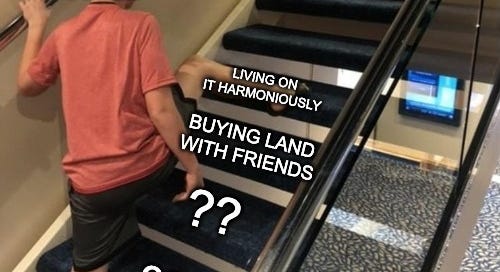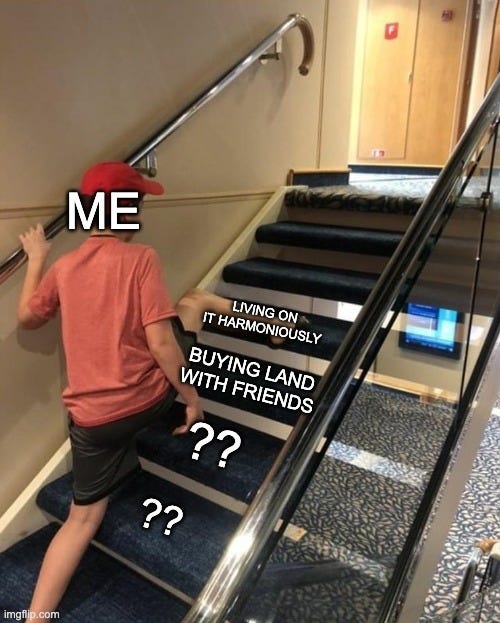Living in Community = Doing the Shadow Work 👤
Interpersonal conflict is inevitable, but it's also part of the process
How do you know if a group of people will get along? Say, at a birthday party, or a dinner party.
Probably the greatest predictor of people getting along, is that they already know each other and have a history of tolerating each other, or even enjoying each others’ company.
If you’ve gone to a party with this group of people and it was fun, it’s reasonable to expect the next one to be fun.
Ok, now how about a camping trip?
What would it take for you to go on a camping trip with a new group of people?
Maybe this new group is the friends of a new romantic partner, or friends of friends. Maybe it’s a fishing trip, or camping at a music festival. Maybe this new group is part of your religious community, if you have one. Disaster relief work is another one.
It’s clear that camping is a step-change greater in the degree of intimacy than going to a dinner party.
What would it take for you to go on a camping trip with a group of people you knew, but not very well?
For me, I’d need to have had hung out with them at least a few times. They’d need to have years-long social history with a close friend or my partner or family. They’d need to have done some camping before!
I guess it would actually take a lot for me to go camping with people I don’t know very well. I’m 37–my time feels more and more precious each year.
Not that I’m constantly having to turn down invitations to camp–actually it might be nice to get more of those! But yeah,
“Camping with strangers”–that’s kinda what I’m doing at Cabin right now, and for the next two months.
It’s been peaceful and regenerating. I’m planning to write a post about my first week at Cabin soon.
Here’s a walkthrough of Neighborhood Zero I filmed recently:
You Can Learn A Lot About People By How They Handle Three Things
Maya Angelou once said, “You can tell a lot about a person by the way (s)he handles these three things: a rainy day, lost luggage, and tangled Christmas tree lights.”
This newsletter is about buying land with your friends, and living on it in relative harmony.
Lately, I’ve been realizing Things That Should Exist is about more than that. I still have a dream of living on land with my friends, but that’s several steps up from some very important foundational things.
As you can see from the image, I have no idea what those things are.
Actually, that’s not entirely true. Here’s my best guess:
Step One: Gather the people. Tell people about your dream to own land and live on it. Find the others. Refine and clarify your vision, while also incorporating feedback from friends, family, and interested parties. See who is interested enough to verbally commit to joining a group that meets weekly or bi-weekly to find and buy a piece of land.
Step Two: Start a group to buy the land. As mentioned above, start having regular meetings. Give a presentation on what your vision is, and incorporate others’ feedback. Figure out what other people want or expect. Search for land, set up viewings, figure out how you’re going to fund the buy. Share progress updates.
Here, you’ll also want to agree on the rules for the land project. Who can come visit and for how long? What can people use the land for? What’s shared in common and what is personal property? How should residents and visitors behave on the land?
You’ll want to nail this stuff down to the best of your ability before you buy land together.
You may even want to have regular dinner parties, and go on a few camping trips together.
Here’s my friend Ioan’s response to the question, “What are the two steps that come before buying land together?”

See where I’m going with this?
Because when it comes to cobuying land, it’s entirely possible that the group sticks together through the 2-3 year process of locating and purchasing some land together, only to argue and fight once people are actually living on the land.
There’s a reason that there are only 3 intentional communities that still exist from the original “back to the land” movement that started in the ‘60’s and 70’s–living in community is hard!
As Americans, one of our prevailing cultural beliefs is one of rugged individualism and hyper-independence.
I think of this as a sort-of “cultural shadow side”.
Shadows Rule Everything Around Me
In case you’re not familiar with the concept of “the shadow”, the term was first coined by Carl Jüng, a psychologist who was a contemporary to Freud and was deeply interested in humanity’s “collective unconscious”, and the universality of myths.
Jüng’s work served as a more holistic foil(also, a slightly “woo-ier” one) to Freud’s deterministic ideas. Freud believed that a person’s neuroses and psychosis were caused by developmental and historical factors, and these factors predetermined a person’s actions, to great predictability.
For Jüng, it was the other way around. Jüng thought that historical factors were relative, and that the present mattered much more.
Jüng and Freud agreed that childhood experiences greatly shape a person’s development. They even agreed that the average person “carries” the effects of adverse childhood experiences into adulthood. These are the “developmental and historical” factors mentioned above.
Jüng called these repressed factors, “the shadow”.
We can define the shadow as having three characteristics.
From this hackspirit.com article on Jüng and the shadow:
The shadow is unconsciously suppressed, often because it’s too painful to acknowledge.
We are not conscious of our shadow, it is a core part of our unconscious. It’s why we sometimes do things that seem irrational, or that we can’t explain as rational.
The shadow is associated with the qualities we have that we worry are less appealing to people.
So why bring this up in the context of “buying land with your friends”?
I bring this up because sooner or later, you have to meet each others’ shadow sides. If you are not prepared to do the work of group accountability and mediation, this kind of conflict could tear your land project apart.
In any relationship, conflict is inevitable.
Using the concept of the shadow as a lens, we can say that, on a long enough timeline, each person’s shadow begins to reveal itself. This is when the real work of “being in community” happens.
How Do You Do the Shadow Work?
This another question where my answer is, “I’m not entirely sure, but…”
Therapy.
As in, I do think it’s a very good signal if you and the members of your pod are each doing therapy on their own.
Working with a therapist on a weekly basis is where each of us can confront our own shadow, and do that specific, focused, and sustained kind of work.
Living in this country is hard. Mental health issues such as ADHD, depression, anxiety, and so on are the norm, and instances are statistically increasing every year.
If you are from one of the world’s happiest countries(most in the top ten are Scandinavian), sure, maybe you can get by without therapy.
For the rest of us, we could probably use the weekly emotional support and care from a therapist to deal with life, work, relationships, health, and so on.
I’d also say that if you have a dream to someday buy land with your friends, being in therapy is practically a requirement.
If you’re not doing the work of confronting and processing your own emotional baggage, it will absolutely come out in group dynamics, and it may prove catastrophic. By doing the work of confronting your own shadow in therapy, you significantly increase the chances of creating a land project where healthy communication and relating are the norm.
I’d also recommend that folks who want to join your land project each have their own therapists, if possible, or have at least done substantial work with a therapist in the past.
If you have mental health clinicians in your group, that’s even better! Along with other kinds of mediators, facilitators, and community organizers.
Conflict Is Inevitable, *And* It’s Also Part of the Process
I mentioned in my last newsletter that I’d recently listened to this episode of the Doomer Optimism podcast, titled “PNW Crew”.
From their podcast page, Doomer Optimism is “a podcast dedicated to discovering regenerative paths forward, highlighting the people working for a better world, and connecting seekers to doers”.
The “crew” in question, consists of three people who live at Elkenmist, a 125-acre property that’s 1.5 hours from Portland, Oregon.
Ioan bought the land, and serves as it’s “benevolent overlord”. Jesse, Denzolo, and Andy all live on the land with Ioan.
I’ve listened to this podcast a few times now, and what stands out the most is the candidness with which the Elkenmist folks speak about the interpersonal conflicts they’ve had in living together, and how they’ve grown to find a sense of acceptance and harmony with each other, on the land.
Jesse mentions one thing that they share in common, is that they are all “willing to try stuff, and willing to fail to a degree”.

“Ritual and hard work”–that tracks, in the original thread this sentiment was repeated with different variations but essentially the same.
So that begs the questions, “What rituals should we do together?”, and “What kinds of hard of work?”
There was a tweet somewhere, I’ll paraphrase: “it’s easy to say you’re going to start a commune when you’re drinking in a bar at 2am. It’s harder to get up in the morning and shovel shit at 5am.”
But hard work is not just (sometimes pungent) physical labor. You might even say that accountability, mediation, and shadow work–both group and personal–are the bigger lift.
On any homestead/intentional community/co-living arrangement you have to have both.
What constitutes minimum-viable accountability and mediation? What does minimum-viable shadow work look like, in the context of those who seek to “live in community”, whether it’s co-living, or just being more generative, supportive, and impactful members of their own communities?
If you liked this newsletter, you can support its creation by subscribing monthly($5), or yearly($35).
You can also share this post with your friends!
Thanks for reading. While I’m at Cabin I plan to increase my publishing frequency for TTSE, and to experiment with a new channel or two, like podcasting, or maybe even TikTok? We’ll see :)



